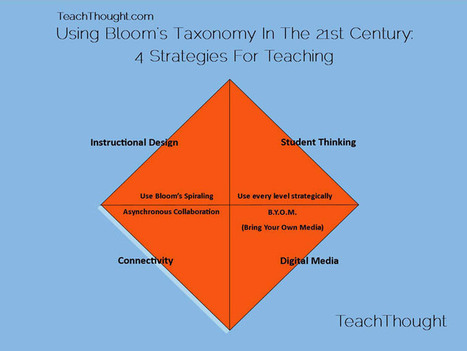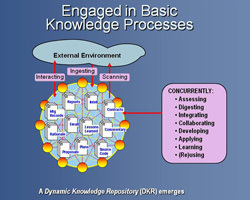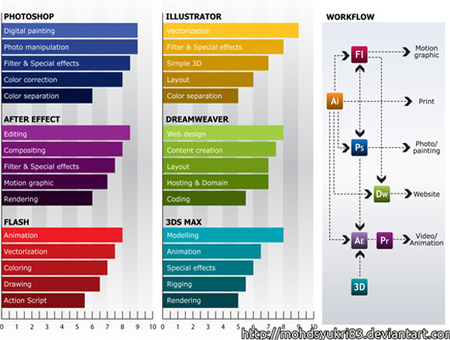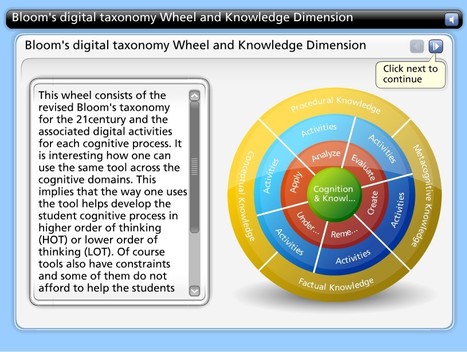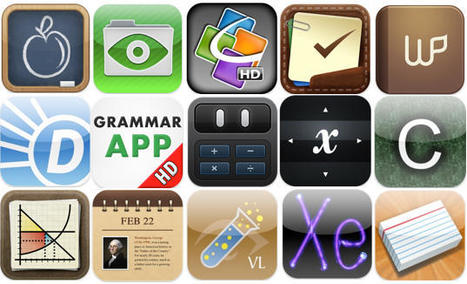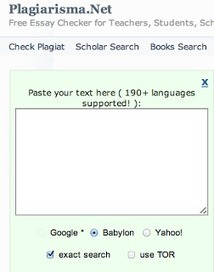Get Started for FREE
Sign up with Facebook Sign up with X
I don't have a Facebook or a X account

| Tags |
|---|
 Your new post is loading... Your new post is loading...
 Your new post is loading... Your new post is loading...
Do multiple-choice tests get a bad portrayal? Are they actually ineffective or are they something ripe for innovation? Socrative's Natalie Bartlett weighs in.
"In Doug Engelbart's words, Collective IQ is a measure of how well people can work on important problems and opportunities collectively – how quickly and intelligently they can anticipate or respond to a situation, leveraging their collective perception, memory, insight, planning, reasoning, foresight, and experience into applicable knowledge. Collective IQ is ultimately a measure of effectiveness. It's also a measure of how effective they are at tackling the complex, urgent problem of how to raise their Collective IQ to the highest potential, so they will be that much more effective at solving complex, urgent problems. As the rate and scale of change around the world increases exponentially, so must our collective ability to dramatically increase our Collective IQ to stay ahead of the curve and thrive." Via Howard Rheingold 
Muriel Flanagan's curator insight,
July 23, 2013 8:48 AM
Engelbart's Collective IQ should resonate with all of us who are interdependant in our workflows - and that means all of us. Individuals need to be able to work as effectively as possible with others, as that allows for leveraging the collective intelligence. As important as individualism is, one cannot underscore the power and importance of collaborating to the most appropriate conclusion in an increasingly fast-paced world. 
Marilyn Korhonen's curator insight,
July 23, 2013 9:42 AM
Interesting concept. This is definitely relevant to collaborative research.

Jan Schwartz's curator insight,
July 23, 2013 10:40 AM
Not necessary about technology, but certainly about education. Thanks to Howard Reingold for the scoop.
Infographics have become quite popular nowadays since they help people find the right path in the chaos of the crowded online world. So, it is understandable why designers appreciate this trend so much. However, it's always useful to learn a few tips and pieces of advice. In this infographic and related article, you will get more details about design, typography, content, color and more... Via Lauren Moss
In the Networked Society, connectivity will be the starting point for new ways of innovating, collaborating and socializing. INSPIRATIONAL VIDEO. Via Dr. Susan Bainbridge
Education setbacks
PowerPoint is a powerful presentation tool that has stood the test of time. There appeared several other presentation tools with more or less varying functionalities and some of them are even web...
Authentic learning is learning in the "real world". It focuses on authentic deeds and students get to solve complex problems and find their solutions using a variety of activities like:...
I’m both in awe and encouraged at the current trend of teacher-led professional learning occurring across our country. Our nations’ teachers are taking control of their own learning and are using a wide variety of social media platforms to do so. Via John Evans 
Kirsty Watts's curator insight,
June 7, 2013 10:09 PM
Creating your own Professional Development is at your fingertips. 
Darlene Clapham K12's curator insight,
June 15, 2013 8:15 AM
Professional Learning, if you develop a passion for it, there is no limit to the nutritious brain food you can consume.
In an excerpt from his new book, psychologist Louis Cozolino applies the lessons of social neuroscience to the classroom. Via Nik Peachey 
Begoña Iturgaitz's curator insight,
April 3, 2013 10:18 AM
More data ro thinks about......I can remember the ' brain- friendly' expression from Mr. Kagan. @KaganOnline
MCG23's curator insight,
April 3, 2013 8:51 PM
interesting article that i myself can relate to in the classroom. I have my kids doing occasional exercise in my year 8 Mathematics class and the benefits of how the classes respond after a brief exercise break is fasinating. Alas I have not done this as much with my older students...i need to break out of this model for my senior students!

Mirjana Podvorac's curator insight,
April 13, 2013 2:36 PM
A valuable insight! Careful not to misuse it!
Games, in contrast, depend on failure to teach. They literally push players to the edge of their ability and knowledge; then the best games change or adapt when a level is reached to push players further. In order to succeed, players must encounter and overcome obstacles both large and small along the way. These disappointments teach students to persevere and foster creativity and adaptability – invaluable skills in our hyper-connected, fast-paced, global economy. Here is a look at some of the ways failure helps students and how games support this valuable learning opportunity. Via Nik Peachey 
Ariana Amorim's curator insight,
May 20, 2013 7:32 AM
Main Topics in this piece: The Benefits of Failure – What Does it Teach Us? Games and Failure – How Games Use Failure to Support Learning Choosing Games for Learning in Higher Ed 
Barbara Truman's curator insight,
May 20, 2013 7:37 PM
Great article that beyond collaboration and also leads to crowdsourcing used in the Fold It game. Digital science, digital artistry, digital citizenship.
This Grammar Day, let's not look at grammar as a cold, harsh mistress. She can also be a fun, kooky aunt. Here are some tricks you can do to make crazy sounding sentences that are still grammatical.
|
Bloom's Taxonomy and digital tools creates an innovative learning environment where students are engaged in their assignments.
From
ieet
Virtually all talk of cognitive enhancement focuses exclusively on the enhancement of individual intelligence. But what about enhancing group intelligence? Via Howard Rheingold 
Howard Rheingold's curator insight,
May 30, 2013 9:14 PM
The author adds some provocative insights to reports of the early work on the collective intelligence of groups. In particular, if social sensivitiy among at least some of the group members can be individually augmented, then the collective intelligence of the group might thereby also be augmented. h/t Ted Newcomb 
Lia Goren's curator insight,
June 1, 2013 4:13 AM
Inteligencia del grupo, mejora y mentes amplidas (si hay mucho error de traducción, acepto el aviso). La investigación a la que se refiere el post contradice la concepción intuitiva de que la inteligencia de las personas, cuando trabajan colaborativamente en un grupo, equivale a la adición del IQ de cada integrante del grupo. No es así. Fenómenos interesantes suceden cuando trabajamos en grupo. 
Lia Goren's curator insight,
June 1, 2013 4:15 AM
Inteligencia del grupo, mejora y mentes amplidas (si hay mucho error de traducción, acepto el aviso). La investigación a la que se refiere el post contradice la concepción intuitiva de que la inteligencia de las personas, cuando trabajan colaborativamente en un grupo, equivale a la adición del IQ de cada integrante del grupo. No es así. Fenómenos interesantes suceden cuando trabajamos en grupo.
"Top performers in any field have one common characteristic: they are always trying to get better. If given a box to check on whether they are “finished products” or “works in progress,” they would check the latter. Carol Dweck’s research would refer to this difference as a fixed and growth mindset.
These top performers accept and embrace performing before an audience because most of their real work is not done in the spotlight; it is done in practice and rehearsal. These top performers are able make sure they are ready and prepared before they step into the spotlight of a performance or event. They are “works in progress” who at a given time, perform publicly as 'finished products.'" Via EDTECH@UTRGV
Katie and I can't cover the entire education app industry by ourselves. Luckily, there are dozens of other sites specifically devoted to education app reviews for teachers and students. Via Ana Cristina Pratas, Pascual Pérez-Paredes 
Nuno Magalhães Ribeiro's curator insight,
July 17, 2013 2:44 PM
Uma revisão muito interessante de um conjunto de apps especialmente concebidas para a organização de professores e estudantes.
“@Larryferlazzo: Great Student Hand-Out On Learning & The Brain http://t.co/rJQdG52zMM #edchat #esl
Nine Lanterns instructional designer Scott Wallace shares his reflections on his studies at the Melbourne Graduate School of Education (MGSE)* at the University of Melbourne.
Our brains don't like unresolved issues, writes El Paso Schools IT director Tim Holt. Problem-based learning offers cliffhangers that keep students engaged. Via EDTECH@UTRGV
From
edudemic
If you haven’t heard of 20% time in the classroom, the premise is simple: Give your students 20% of their class time to learn what they want. Yes, that’s it. Below is a list of the 10 reasons you should consider 20% time in your school, and you will not regret making that choice! Via Nik Peachey 
Nik Peachey's curator insight,
May 11, 2013 2:34 PM
This is a great idea that I first heard of as being a Google day. Great way to build independence and learner autonomy.
If you think an apostrophe was one of the 12 disciples of Jesus, you will never work for me. If you think a semicolon is a regular colon with an identity crisis, I will not hire you.
_______________ An interesting article to say the very least.
"Got Poor Grammar? I got no jobs 4U!"
Though author Kyle Wiens' company is all about writing, he makes a good point that any industry might benefit from his policy of using a grammar test as a make or break litmus test for hiring.
I'd certainly consider sharing this article with students, perhaps asking them to respond in writing giving their thoughts on any of the following quotes from the article...
• "I have a 'zero tolerance approach' to grammar mistakes that make people look stupid."
• "I just think they (job applicants who have bad grammar) deserve to be passed over for a job — even if they are otherwise qualified for the position."
• "...if job hopefuls can't distinguish between "to" and "too," their applications go into the bin."
• (referencing grammar's relevance for all companies, "Good grammar is credibility, especially on the internet. In blog posts, on Facebook statuses, in e-mails, and on company websites, your words are all you have."
• "On the face of it, my zero tolerance approach to grammar errors might seem a little unfair. After all, grammar has nothing to do with job performance, or creativity, or intelligence, right?
Wrong. If it takes someone more than 20 years to notice how to properly use "it's," then that's not a learning curve I'm comfortable with. So, even in this hyper-competitive market, I will pass on a great programmer who cannot write."
• "I've found that people who make fewer mistakes on a grammar test also make fewer mistakes when they are doing something completely unrelated to writing — like stocking shelves or labeling parts."
• "Applicants who don't think writing is important are likely to think lots of other (important) things also aren't important. And I guarantee that even if other companies aren't issuing grammar tests, they pay attention to sloppy mistakes on résumés. After all, sloppy is as sloppy does."
There is much to be said in praise of Wiens' reasoning.
HOWEVER, is there an English teacher out there who hasn't repeatedly seen students do exceptionally well on grammar tests while making mistakes in a subsequent writing assignment that demonstrate a complete failure to have actually incorporated many of the very tested grammar rules into their actual writing performance?
This is not to say that Wiens' policy is ill-informed. I only hope that his grammar test is well-designed; sophisticated enough to determined the quality of the applicant's actual grammar USAGE rather than merely the applicant's ability to remember the rule or to play the guessing game odds on mulitple choice tests "successfully."
~ http://www.GoogleLitTrips.com ~
Via GoogleLitTrips Reading List
From
www
Does texting mean the death of good writing skills? John McWhorter posits that there’s much more to texting -- linguistically, culturally -- than it seems, and it’s all good news. Via GoogleLitTrips Reading List 
GoogleLitTrips Reading List's curator insight,
April 23, 2013 9:30 AM
An intriguing defense of txtng.
I'm not a huge fan of texting myself. I text occassionally, but still prefer to just type what I would say if standing near the person. I make few attempts to save "valuable time" by abbreviating the spelling of words I'm using. Though recently I've picked up suggestions that not doing so is somehow sending red flags that I'm too old to be paid any attention to by those so much younger than I am and apparently so much wiser than I am.
Actually, part of my resistance to using texting abbreviation is probably motivated by the same forces that I used to perceive in others as being signs of a Luddite.
So how to respond to this challenging talk?
What did I hear that I hadn't sufficiently considered before?
And, what did I not hear that I think should also have been considered?
I won't bother you with my lengthy responses to both questions. I actually meant them to be rhetorical anyway.
But, I did hear several thought-provoking and potentially opinion shifting ideas producing a positive response that I had not previously held regarding texting.
And, at the same time, there were a few concerns that I still have regarding texting's place in the development of effective communication between people or perhaps that comes inbetween people that weren't addressed.
That's all, I'm just saying.
|



